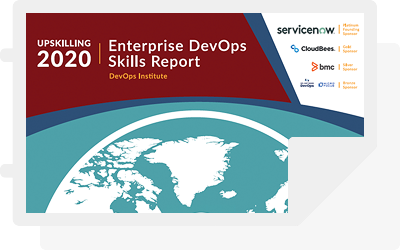Gone are the days of shipping your product, clapping yourself on the back, and moving onto the next piece of software. Customers expect regular updates with added functionality and increased ease of use that requires you to respond in near real-time to their demands to remain ahead of the competitors vying for their business. Bringing together cross-discipline teams into a cohesive and finely-tuned machine has proven to be a potent answer to the constant demand for software and service improvements.
As new terms come and go in the IT sector, it’s important to stay on top of the trends and understand the reasoning behind them. Not every new trend is worth investing your enterprise’s resources into but missing the boat can sometimes result in being left behind in the dust by the competition. DevOps may be the new kid on the block, but it has firmly established itself as a powerful approach to adapting to the quickly changing world we find ourselves in today.
No singular approach can be applied wholesale to each business as a plug and play answer to all its woes. Obtaining an understanding of the emerging trends and terms is mandatory for assessing whether the solutions are viable options for the unique needs of your business. Software development lifecycle (SDLC) is a relatively self-explanatory term that simply refers to the loop of software development in the software as a service (SaaS) industry. SDLC is generally seen to revolve around five stages that consist of analysis, design, development and implementation, testing and deployment, and maintenance.
The idea of orchestration within the IT world is a bit less obvious comparatively and is more pertinent to the topic at hand.
What is Cloud/DevOps Orchestration?
Orchestration, when placed within the context of information technology enterprises, is essentially the automated coordination of automated activities. It’s easiest to think of general automation as basic, fine-grained tasks that are programmatically performed through scripts on a micro level while orchestration is the macro perspective coordination of these automated tasks. Cloud orchestration involves automating the workflow processes that occur to deliver resources as a service. DevOps orchestration, on the other hand, is the coordination of an entire organization’s DevOps practices and the automation tools they employ in pursuit of their goals.
It’s difficult to overstate the importance that automation plays in the successful implementation of DevOps practices. Due to the drastic impact that automating has on the speed of SDLC, the orchestration of the automation processes also plays a large role in maximizing the potential of your automation tools and increases the return on your DevOps investment.
The Impact of Automation and Orchestration
While not every aspect of development can be automated, there are heaps of activities that can and should be automated in search of increasing DevOps optimization and overall speed and reliability of development. Data centers are a prime location to begin automating routine due to how many recurring tasks tend to take place there. Servers, networks, and databases all require regular maintenance and security tasks that can be automated to save man hours in the long run while also ensuring fewer things slip through the gaps. Automation of data centers can improve IT efficiency while reducing deployment failures and providing more manageable complexity across environments.
Job scheduling and workload automation can also drastically improve efficiency by simplifying application delivery and managing the data required by batch jobs. Automating application workflows helps to reduce downtime and curb the expenses caused by business interruptions. Automation also aids in enhancing scalability thanks to its flexible nature that simplifies even the most complex of systems. Overwhelming tasks can be broken into smaller, automatable processes that are tackled programmatically and without the need for constant tabs being kept on them.
The automation of IT processes improves collaboration by supporting built-in and audited annotation for crystal clear communication. Automation tools also give you the ability to handle Big Data with your existing enterprise skills and best practices. The customization available through automation platforms enables you to setup orchestration across your organization that works in the way you need it to. The deep functionality and standardization available through automation tools and their enterprise-wide user interface makes for more simplified management of even the most complex systems. These tools also support self-servicing which allows business users the freedom they need to manage workloads and submit queries at any time with a user-friendly and web-based mobile tool that doesn’t require a workload automation expert to leverage.
DevOps orchestration coordinates all of these automated tasks and more to provide even further enhanced optimization and oversight. Orchestrating automated IT processes accelerates service delivery speeds and lowers the cost of doing so all while increasing the reliability of deployments. Orchestration tools customized for your organization’s needs can help you make the most of your automation efforts and DevOps implementation.
There is no silver bullet solution or a blueprint that can be followed verbatim that will enhance your enterprise overnight, but DevOps is a mentality that encourages a culture of collaboration as well as a suite of tools that aid collaboration by enhancing communication across the organization.
DevOps: Solutions for You
If DevOps sounds like a good fit for your organization’s needs but you want to make sure you get it right the first time, BMC is the IT solution partner you need. Read more about how orchestration, automation, and DevOps systems can help increase the rate at which you deploy stable products with BMC’s free eBook: Automate Cloud and DevOps Initiatives. To learn more about automating the software delivery lifecycle, check out BMC’s eBook Automate Cloud & DevOps Initiatives Across All Phases.
BMC’s TrueSight Orchestration helps to lower the costs of server, network, and database audits by up to 25% while cutting manual work by 90% – freeing up valuable man hours for tasks that have higher value returns for your organization. Automation of employee onboarding processes is available in addition to connecting processes with drag and drop workflow. With thousands of pre-built workflows available at your fingertips, TrueSight Orchestration is ready to deliver fast time to value and can adapt to your changing business with ease.
BMC expert consultants are available to work with you to bring their knowledge and expertise to your organization. In addition to education and consultation, BMC provides custom-tailored Implementation Services for your organization to tackle the unique challenges you face. When partnering with BMC, you get:
- Faster service delivery: Agile releases that keep up with rapid demand
- Visibility across data: Ensure compliance and data accuracy
- Cost-effective service: Increased productivity and performance
- Experienced DevOps professionals: Equip you with the tools you need for success
- Conversion or upgrade: Seamless modernization or total replacement
- All tailored for the specific needs of your organization.
Download or view the Solution Implementation Overview online to learn more about how BMC Consulting Services can help you. Learn more about how DevOps and Application Deployment best practices can enable your teams to create better software faster than ever before. Then contact the experts at BMC to learn more about how to incorporate DevOps orchestration systems into your DevOps practices for enhanced building, testing, and deployment success.







